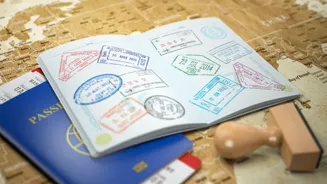The program gives US consular officers the discretion to impose bonds on visitors from countries with high rates of visa overstays, according to a Federal Register notice. Bonds could also be applied to people coming from countries where screening and vetting information is deemed insufficient, the notice said.
President Donald Trump has made cracking down on illegal immigration a focus of his presidency, boosting resources to secure the border and arresting people in the US illegally.
He issued a travel ban in June that fully or partially blocks citizens of 19 nations from entering the US on national security grounds.
Trump's immigration policies have led some visitors to skip travel to the United States. Transatlantic airfares dropped to rates last seen before the COVID-19 pandemic in May and travel from Canada and Mexico to the US fell by 20% year-over-year.
Effective August 20, the new visa program will last for approximately a year, the government notice said. Consular officers will have three options for visa applicants subjected to the bonds: $5,000, $10,000 or $15,000, but will generally be expected to require at least $10,000, it said.
The funds will be returned to travelers if they depart in accordance with the terms of their visas, the notice said.
A similar pilot program was launched in November 2020 during the last months of Trump's first term in office, but it was not fully implemented due to the drop in global travel associated with the pandemic, the notice said.
A State Department spokesperson listed the criteria that will be used to identify the countries that will be affected, adding that the country list may be updated.
"Countries will be identified based on high overstay rates, screening and vetting deficiencies, concerns regarding acquisition of citizenship by investment without a residency requirement, and foreign policy considerations," the spokesperson said.
The State Department was unable to estimate the number of visa applicants who could be affected by the change. Many of the countries targeted by Trump's travel ban also have high rates of visa overstays, including Chad, Eritrea, Haiti, Myanmar and Yemen.
US Travel Association, which represents major tourism-related companies, estimated the "scope of the visa bond pilot program appears to be limited, with an estimated 2,000 applicants affected, most likely from only a few countries with relatively low travel volume to the United States."
Numerous countries in Africa, including Burundi, Djibouti and Togo also had high overstay rates, according to US Customs and Border Protection data from fiscal year 2023.
A provision in a sweeping spending package passed in the Republican-controlled US Congress in July also created a $250 "visa integrity fee" for anyone approved for a non-immigrant visa that could potentially be reimbursable for those who comply with visa rules. The $250 fee goes into effect on October 1.
US Travel said that fee could hinder travel and said "if implemented, the US will have one of, if not the highest, visitor visa fees in the world."

















